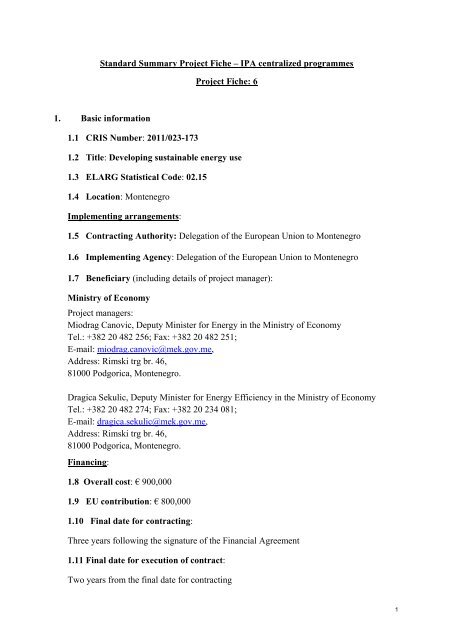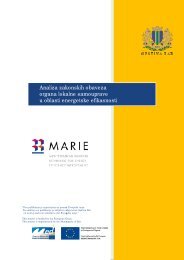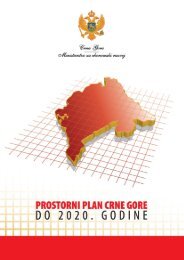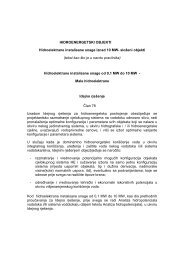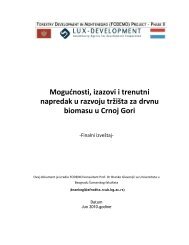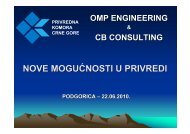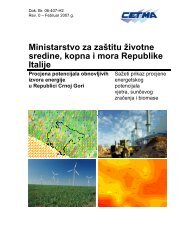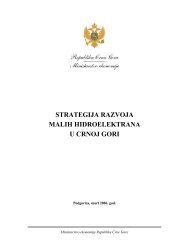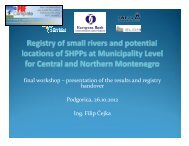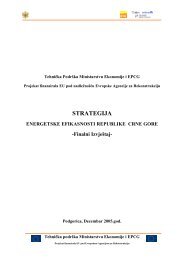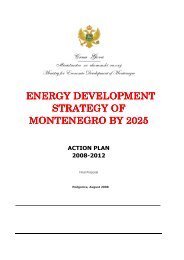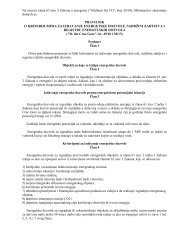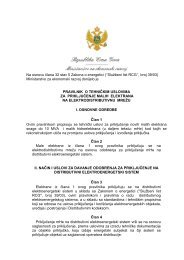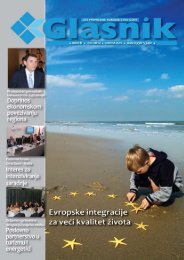appendix 5 â project fiche template - European Commission - Europa
appendix 5 â project fiche template - European Commission - Europa
appendix 5 â project fiche template - European Commission - Europa
Create successful ePaper yourself
Turn your PDF publications into a flip-book with our unique Google optimized e-Paper software.
Standard Summary Project Fiche – IPA centralized programmesProject Fiche: 61. Basic information1.1 CRIS Number: 2011/023-1731.2 Title: Developing sustainable energy use1.3 ELARG Statistical Code: 02.151.4 Location: MontenegroImplementing arrangements:1.5 Contracting Authority: Delegation of the <strong>European</strong> Union to Montenegro1.6 Implementing Agency: Delegation of the <strong>European</strong> Union to Montenegro1.7 Beneficiary (including details of <strong>project</strong> manager):Ministry of EconomyProject managers:Miodrag Canovic, Deputy Minister for Energy in the Ministry of EconomyTel.: +382 20 482 256; Fax: +382 20 482 251;E-mail: miodrag.canovic@mek.gov.me,Address: Rimski trg br. 46,81000 Podgorica, Montenegro.Dragica Sekulic, Deputy Minister for Energy Efficiency in the Ministry of EconomyTel.: +382 20 482 274; Fax: +382 20 234 081;E-mail: dragica.sekulic@mek.gov.me,Address: Rimski trg br. 46,81000 Podgorica, Montenegro.Financing:1.8 Overall cost: € 900,0001.9 EU contribution: € 800,0001.10 Final date for contracting:Three years following the signature of the Financial Agreement1.11 Final date for execution of contract:Two years from the final date for contracting1
institutional framework and in particular strengthening of administrative andimplementation capacities are also needed.2.4 Link with MIPD:Multi-annual Indicative Planning Document (MIPD) 2011-2013 for Montenegrorecommends that Montenegro should develop "additional efforts" in the fields oftransport policy and energy. Furthermore, the MIPD 2011-2013 specifies that relatedto energy, as a member of the Energy Treaty Community, Montenegro is obliged toimplement substantial parts of the acquis in energy, environment and competition andthat there are important shortcomings which will need to be addressed with financialsupport. The MIPD enlists the Public administration reform as one of the 7 mainsectors for IPA 2011-2013, with objective to further support the country's efforts(centrally and locally) in its reform and alignment with relevant acquis. Namely, incollaboration with other donors, IPA will provide institution building supportincluding to the existing strategies, and in particular for the preparation of the requiredlegislation, for the improvement of managing skills throughout the publicadministration. One of the specific objectives in the field of environment and climatechange is developing actions to mitigate and adapt to climate change, wheresustainable energy use in transport and use of biofuels represents one of directmeasures towards this objective. In the sector of transport, which represents anotherkey assistance sector, the efforts must be driven towards the strengtheningadministrative and implementation capacities, as it is also recommended in the<strong>Commission</strong> Opinion on Montenegro's application for membership of the<strong>European</strong> Union.2.5 Link with National Development Plan (where applicable)N/A 1 .2.6 Link with national/ sectoral investment plans(where applicable)Montenegro adopted updated Energy Policy for Montenegro through 2030 2 (EPM) in2011. EPM defines as one of the three main priorities sustainable development of energysector in accordance with principles for environmental protection and though efficientenergy use and use of renewable energy sources. Moreover, strategic goals clearly statethat energy efficiency and renewable energy sources are priorities and their focus ontransport sector is stressed. Aside from the EPM the development of the energy sector inMontenegro is also guided by the Energy Development Strategy (EDS) through to 2025 3 ,adopted in December 2007 and programmes and <strong>project</strong>s are presented in Action Plan forImplementation of EDS (2008 – 2012) 4 , adopted in October 2008. EDS gives plans for1 National Development Strategy and Plan are being developed under IPA 2009 <strong>project</strong> that is ongoing.2 Energy Policy for Montenegro through 2011 (http://www.gov.me/rubrike/ekonomskiprogrami/103843/Energetska-politika-Crne-Gore-do-2030-godine.html)3 Energy Development Strategy through to 2025 (http://www.oiecg.me/doc/The%20startegy%20for%20energy%20development%20until%202025.pdf)4 Action plan for implementation of EDS (2008-2012) (http://www.oiecg.me/doc/The%20startegy%20for%20energy%20development%20until%202025.pdf)3
Montenegro energy sector in accordance to existing estimations of potential, needs andobligations in accordance to Energy Community Treaty signed in 2005. Therefore in thesector of transport the accent is mostly put on fulfilling the need of introduction ofbiofuels, while Strategy for Energy Efficiency (SEE) adopted in 2005 5 focuses more ondecrease of energy consumption in this sector. The SEE calls for necessary assessment ofneeded and applicable measures in this sector while pointing out the lack of appropriateenergy statistics in all sectors, and especially transport and calls for systematic approachto energy management. However, Action plan for Energy Efficiency for period 2010-2012 6 outlines the needs of this sector in more detail and gives specific energy efficiencymeasures needed for transport sector, specifically road transport. Legislation plan for 2011for Montenegro Government envisages the development of Law on using renewableenergy sources in transport, specially biofuels, as well as mandatory secondary legislationin the area of energy efficiency.Furthermore, EDS plans for development of small cogeneration plants industrialcogeneration plant and for local use, even though Energy Law adopted in 2010 calls foradoption of Programme for use and development of cogeneration, as well as regulatoryframework specifically for high-efficiency cogeneration in harmonization with Directive2004/8/EC on the promotion of cogeneration based on a useful heat demand in the internalenergy market. Aside from this framework, Montenegro is currently developingregulatory framework for crude-oil stocks for which 90-day reserves are planned in EDS,taking into account maintenance of existing 45-day reserves.However, due to recent developments in the energy sector, including legislative andstructural changes, and additional obligations in accordance with Energy CommunityTreaty, Government of Montenegro decided to update the EDS and SEE during the yearof 2011. These changes will impose a more demanding and dynamic development of thesector, taking a closer look at sustainable energy growth.Consequently this <strong>project</strong> is fully in line with not only national strategies and action plansbut also with the EU sectoral approach plans, especially if considering the Energy 2020 7plan, which puts an accent on energy security, energy efficiency, sustainable energydevelopment, tapping into potential of transport sector and supporting renewable energyuse.3. Description of <strong>project</strong>3.1 Background and justification:Montenegro is a country with a fast-changing energy sector. Currently Montenegro’senergy system consists of three large producers of electrical energy and seven small HPPs.Three large producers include Thermal Power Plant Pljevlja on coal, that has beenrehabilitated in 2010, with installed power of 210 MW and two HPPs, HPP Piva withinstalled power of 307 MW and HPP Perucica with installed power of 342 MW. The totalinstalled capacity is 868 MW. Along with large producers, Montenegro energy sector is5 Energy Efficiency Strategy for Montenegro (http://www.questionnaire.gov.me/Annexes/Annex072.pdf)6 Action plan for Energy Efficiency for period 2010-2012 (http://www.energetskaefikasnost.me/download/Energy%20Efficiency%20Action%20Plan%20for%20Period%202010-2012.pdf)7 Energy 2020 (http://eur-lex.europa.eu/LexUriServ/LexUriServ.do?uri=COM:2010:0639:FIN:EN:PDF)4
characterized by two large industrial consumers, the Aluminum Plant Podgorica (KAP)and the Steel Works Plant in Niksic that consume about 45 % of the final energyconsumption or 91 % of the final energy consumption in industry.Montenegro has primary energy sources that include brown coal and lignite, but moreimportantly has a high unused energy potential of hydropower, biomass, solar radiationand wind. There is no oil or gas exploration. With continuous growing consumption andlack of new energy producers over the last three decades, Montenegro has became asignificant importer of electricity, with average import of 30 % of electricity consumedand all petroleum products consumed. In order to lower import and improve energyindependence, Montenegro has started processes and is working on improving theenvironment for investment in energy sector, so domestic resources could be used forgeneration of electricity as well as heating from renewable energy sources.In electricity sector, Montenegro is currently ongoing a tendering procedure forconstruction of HPPs on river Moraca. Also, Montenegro has given out 13 concessions forconstruction of 33 sHPPs with total capacity of 100 MW, as well as signed two contractsfor construction of two wind farms with total capacity of 96 MW that are currently in theprocess of receiving permits for construction.Montenegro power system has been developed in the past with focus on consumers andboth transmission and distribution system operators are switching to a more producer andconsumer oriented policy. Aside from planning development of the network for potentialnew producers, transmission system for conventional HPPs and wind farms anddistribution system for small producers such as sHPPs located in less developed areas ofMontenegro, and analyzing the influence on the system, transmission system is planningexpansion through interconnections, specifically with undersea cable with Italy.In heating sector, considering significant biomass and solar potential, Montenegro isstarting with valorization of biomass through district heating systems in Pljevlja andKolasin, and through fuel switch in reconstruction of public buildings, as well asvalorization of solar radiation for heating for southern and central regions of Montenegro.Petroleum products, as previously mentioned are all imported, and managed by a numberof oil companies awarded with the licenses for the sale and supply of petroleum products.In addition, certain quantities of petroleum products are directly purchased by largeconsumers through international tenders. Imported petroleum represents 98 % ofconsumption in transport sector, which represents 20 % of final energy consumption inMontenegro. Road transport is 88 % of the whole transport consumption, where individualconsumers represent 60 – 80 % of consumption. Energy use in this sector is based onimported fuel, while energy use is very inefficient and motor gasoline consumption growsat a 7.4 % rate during the past few years.In order to further help the transformation of energy sector and its harmonization with EUenergy policy, Montenegro made significant legislative changes by adopting Energy Lawand Energy Efficiency Law in 2010. The main strategic objectives deal with completingthe regulatory framework and improving significantly the institutional framework,statistical system and also demonstrate tangible and concrete results from implementedmeasures of sustainable energy use. These two laws assign responsibilities and obligationsto different bodies from the Government and the Ministry of Economy responsible forenergy, to the local self governments, energy supplies and large energy consumers and5
implement latest directives on market rules, competitiveness, energy security, gas,cogeneration, crude-oil stocks, renewable energy sources and energy efficiency, excludingin most parts energy use in transport sector. Moreover, in order to develop statisticalsystem in line with EU policies, which can be used for monitoring and quality reporting ofchanges in the energy sector, Montenegro is currently receiving assistance from SlovenianGovernment through a <strong>project</strong> that will be completed by mid 2012.Based on the obvious reforms taking place in energy sector the EU’s Progress Report onMontenegro accompanying Enlargement Strategy and Main Challenges 2009-2010 (COM2009) 533 final) clearly states that steps have been taken towards meeting therequirements of the Energy Community Treaty, but that further efforts are required andthat promoting energy efficiency and renewable energy sources is crucial. Furthermore,the new EU Energy strategy 2020 calls for the rebalance of energy actions in favor of ademand-driven policy, empowering consumers and decoupling economic growth fromenergy use. In particular, the transport and construction industries must pursue an activeenergy savings policy and diversify towards non-polluting energy sources. This Strategylists as its first priority “an efficient use of energy that translates into energy savings of 20% by 2020” and demands that special attention should be given to the sectors with thelargest potential to make energy efficiency gains, namely the existing building stock andtransport sector.Therefore, in line with EU energy policy, Montenegro’s obligation towards fulfilling theacquis as well as in line with the most urgent issues in the energy sector in Montenegro,this <strong>project</strong> proposes to analyze in detail Montenegro’s possibilities and potential forincrease of sustainability in transport sector and developing adequate regulatoryframework, as well as to analyze possibilities for use of high-efficiency cogeneration forwhich regulatory framework will be adopted. Moreover, <strong>project</strong> aims to analyzeeconomical and strategic ways in fulfilling necessary 90-day crude oil storage alignedwith national strategies. Finally, aside from informing the public of the sustainable use ofenergy in transport sector, which is important considering their input in consumption ofenergy in this sector, <strong>project</strong> plans to train existing capacity in administration to be moreaware of Montenegro’s obligations and potential solutions and their implementation.3.2 Assessment of <strong>project</strong> impact, catalytic effect, sustainability and cross borderimpact (where applicable)The development and overall activity of energy sector is repeatedly and indivisiblyconnected with the social position of the citizens of Montenegro. Besides direct impactthrough smarter energy use, the social position is influenced by the possibility ofemployment, entrepreneurship, additional education, the modernization of technologicallevel of labor structure in Montenegro, as well as overall quality of life through theachievement of policy of secure energy supply and enabling the choice of energy sourcesand their suppliers.Investing in the development of the energy sector contains another very importantcomponent which materially impacts the social position of the citizens and it reflects inthe fact that the space for “black capital” and so called “grey economy” is narrowedthrough these investments since the majority of funds are directed through regular capitalflows, thereby eliminating appearances that has harmful impact on the social position ofthe citizens.6
Project impacts would include:• Convergence toward EU energy 2020 targets from the level at the beginning of the<strong>project</strong> by end-<strong>project</strong> date and by an average 1% per annum over the following 3years from the end-<strong>project</strong> level;• Rise in the sustainability of energy supply by end-<strong>project</strong> and a further overall riseduring the following 5 years;• Reduction of emission of greenhouse gases and local air pollutants, especially relatedto pollution generated from road transport;• Promotion of sustainable use of energy in transport by offering variousenvironmentally friendly modes of transport and options of biofuels utilization thatwould, both directly and indirectly lead to stimulation of a market demand for EE andRES transport products, services and new technologies (new more fuel efficientvehicles, hybrid and electric vehicles, better public transportation, intelligent trafficmanagement, energy efficiency standards for vehicles, quality check of fuels used andthe like);• Improvement of functional and healthy environment, better access to roadinfrastructure, increased safety, comfort and overall living standards;• Energy security through managing the needed reserves of crude-oil;• Introduction of variable sources of energy production and various possibilities forreplacement of otherwise imported energy.Since <strong>project</strong>s aims to not only introduce changes at the regulatory level, but alsointroduce new measures for more sustainable energy use through coordination of variousgovernmental bodies, after the <strong>project</strong> those bodies should be able to continue theimplementation of the outlined measures to further improve transport sector. Studies donethrough the <strong>project</strong> will involve local governments and energy managers and MONSTAT,who will be responsible for further collection of information and data for quality statisticson energy use in various sectors and quality of fuel used. Therefore it is assumed that theywill be thought to collect adequate statistics correctly even after the <strong>project</strong> is finished.3.3 Results and measurable indicators:Sustainable energy use in transport sectorResult 1. Renewable energy sources (RES) and energy efficiency (EE) potential isassessed and Action plan with top priority measures for sustainable use ofenergy in transport sector prepared;• 3 studies completed by the end of second quarter from <strong>project</strong> start and anAction plan developed by the end of the fifth quarter from <strong>project</strong> start andadopted by the end of the sixth quarter from the start of the <strong>project</strong>;7
• Guidelines and top priority measures known to key stakeholders by the end ofthe seventh quarter from the start of the <strong>project</strong>;Result 2. Regulatory framework for EE and RES in transport sector is developed andprepared for adoption, as well as legislation for energy use in transport• Number of relevant legal acts developed and ready for adoption by the end ofthe <strong>project</strong>;Result 3. Statistical monitoring and reporting system for energy consumption intransport sector reviewed and operating including update of necessary softwareso that level of compliance of statistical and monitoring system withEUROSTAT is checked and suggestions given;• Level of compliance of statistical and monitoring system with EUROSTATchecked and suggestions given by the seventh quarter from the start of the<strong>project</strong>;Result 4. Energy management monitoring schemes for transport sector developed andimplementation started.• 25 people capable of overseeing and reporting energy use by the end of the<strong>project</strong>.Sustainable energy use in other areas of energy sectorResult 5. Study on possible economic and strategic solutions for crude oil and oilproducts stocks undertaken;• Study completed and delivered by the end of the forth quarter from the start ofthe <strong>project</strong>;Result 6.Undertake a study for potential of use of high efficiency cogeneration and giveguidelines for development;• High efficiency cogeneration nationwide study report delivered by the end ofthe third quarter from the beginning of the <strong>project</strong> and action plan developedby the end of the sixth quarter from the <strong>project</strong> start and adopted andguidelines known to key stakeholders by the end of the <strong>project</strong>;Result 7.Policy advise on ongoing and future changes needed for sustainable use ofenergy given continuously thought the period of the <strong>project</strong>.• Continuous policy advise and additional needed guidelines given continuouslythroughout the period of the <strong>project</strong>;Capacity development and awareness raising on sustainable energy useResult 8.National administration (relevant ministries, national agencies, offices andadministrative workers from local governments) trained for furtherimplementation and compliance with EU energy policy;8
• 50 people trained and familiar with EU energy policy and obligations forMontenegro by the end of the Project;Result 9.Awareness raising surveys conducted, data analyzed and interpreted.• 1 baseline general public awareness raising survey conducted at the beginningof the <strong>project</strong> and one final general public awareness raising survey conductedat the end of <strong>project</strong>.3.4 Activities:The <strong>project</strong> will be implemented through two Service Contracts due to the national cofinancingrequirement with the following activities:Sustainable energy use in transport sectorActivity 1. Develop studies to assess RES and EE potential and develop Action plan withtop priority measures for sustainable use if energy in transport sector• Undertake studies to assess potential RES and EE for sustainable use if energy intransport sector- Undertake a study on bio fuels potential and secondary bio fuels productionpotential in Montenegro- Undertake a study on possibility of introduction of electricity from renewableenergy sources in transport sector- Undertake a study on energy efficiency potentials in transport sector• Develop Action plan for RES and EE in transport- Develop Action plan for introducing the renewable energy sources andenergy efficiency measures into a transport- Dissemination of information about the new energy efficiency technology invehicles and the transport sector as well as about use of existing and usedvehicles that can take advantage of renewable energy sourcesActivity 2. Develop EE and RES regulatory framework and review legislation of energyuse in transport sector• Finalize and give for adoption law on renewable energy sources in transportsector.• Develop regulatory framework regarding renewable energy sources and energyefficiency in transport sector that would identify the top priority measures thatneed to be implemented9
Activity 3. Review existing and make operational statistical monitoring and reportingsystem for energy consumption in transport sector• Use software to monitor quality, use and the production of biofuels so that itcomplies with the regulatory framework• Use national energy database to monitor energy consumption with special focus ontransport sector according to the EUROSTATActivity 4. Further improvement of the existing information system to accommodateenergy management and monitoring of energy use with special focus ontransportSustainable energy use in other areas of energy sectorActivity 5. Develop a study on possible economic and strategic solutions for crude oil andoil products stockActivity 6. Develop a study on the potential of high efficiency use in Montenegro anddevelop action plan for development and use of high-efficiency cogenerationActivity 7. Give advise to Ministry of Economy for further improvement in energyregulation and requirementsCapacity building and awareness rising on sustainable energy useActivity 8. Deliver trainings and information to national administration includingadministrative workers from relevant ministries, governmental bodies andlocal governmentsActivity 9. Prepare, develop and implement baseline and final awareness surveys,including the comparison of baseline and final data, with focus on positivetrends from the analysis of final dataA Steering Committee shall be established to guide the Consultant in achieving its tasks, tomonitor progress of the <strong>project</strong> activities and to ensure timely achievement of results. Thestructure and representatives to the Steering Committee shall be determined during theInception Phase upon consultation with the beneficiaries. The Steering Committee will meetat the end of the Inception Phase, on six month’s basis as well as whenever any of itsmembers deems it necessary.3.5 Conditionality and sequencing:10
• Draft law on energy use in transport prepared according to relevant EU directivesby mid- 2012• Coordination and cooperation agreement among Ministry of Economy, Ministryof Transport and Maritime Affairs, Ministry of Sustainable Development andTourism, Ministry of Agriculture and Rural Development, other relevantinstitutions and municipalities• National co-financing of € 100,000 must be secured by state budgets for 2013and 2014.• Sufficient number of employees and adequate office space• Statistical system for monitoring of energy consumption and adequate ITinfrastructure in place by mid-2012• Financial agreement signed.3.6 Linked activitiesTA to Montenegrin Energy Efficiency Unit-an EU funded <strong>project</strong>s (via <strong>European</strong>Agency for Reconstruction-EAR) benefiting Montenegrin Energy Efficiency Unit (EEU)within the Ministry for Economic Development (MED), implemented between March2006 and June 2007. The results of the <strong>project</strong> concentrated on institutional baseformation for energy efficiency, outlining the responsibilities, organizational structure andoperational methodologyAdvisory support for energy sector reform-an EU/EAR funded <strong>project</strong> benefitingEPCG and MfED, implemented between April 2006 and March 2008.Energy Efficiency in Montenegro-GIZ (Germany) funded <strong>project</strong> benefiting the MED,implemented between April 2008 and December 2010, which concentrated on buildingthe awareness on necessity of energy efficiency and renewable energy sources, creatinginitial legislative framework and following implementation of specific pilot measuresrelated to overall energy efficiency.Advisory Services for the Implementation of the Energy Strategy-KfW (Germany)funded <strong>project</strong> benefiting the MED, implemented between March 2008 and February2012.Energy Development Strategy of Montenegro by 2025 and the Action Plan-anUNIDO funded <strong>project</strong> benefiting the MED, implemented between September 2006 andNovember 2007 (Strategy) and between January and May 2008 (Action Plan).Energy Efficiency in Montenegro-Ministry of Foreign Affairs (Norway) funded <strong>project</strong>benefiting the MED, and EE private Sector, implemented between October 2007 and July2008. The <strong>project</strong> created pool of experts specialized in energy auditing and certificationand gave EE measure recommendations in public sector that were used later on inreconstruction <strong>project</strong>s (financed via KfW and World Bank loans)11
Technical assistance to the Ministry of Economy Renewable energy unit fordevelopment of RES field in Montenegro – GIZ/CIM Government of Germany October2009 – October 2011.Different options for public-private partnership regarding future production ofelectrical energy in Montenegro - World Bank implemented December 2008- March2010. The <strong>project</strong> outlines recommendations on different energy production options inMontenegro, including the option for cogeneration.Western Balkans Sustainable Energy Direct Financing Facility - InstitutionalCapacity Building – EBRD implemented September 2009- March 2010. The <strong>project</strong>outlined the milestones on how to optimize the supervision process of legislationimplementationClimate Change - Initial National Communication (INC) under UNFCCC -UNDPimplemented May 2008 - May 2011. ME was included in the <strong>project</strong> in relation to GHGemissions from energy sector and creation of recommendation areas for climate changemitigation, including the specific references to energy and transport sectorsMontenegro Energy Efficiency Project (MEEP) - World Bank – loan for EEreconstruction in public sector, implemented January 2009 - December 2012. The <strong>project</strong>is ongoing and concentrates on reconstruction of buildings in education and healthTechnical assistance for implementation of the Energy Community TreatyMontenegro IPA 2007 (JEE, REGAGEN, EPCG), granted by <strong>European</strong> Union and<strong>European</strong> <strong>Commission</strong> (1.5 million €). February 2010 – September 2011. The <strong>project</strong> iscurrently ongoing and Project and aims to develop energy sector policies that will ensurethe implementation of commitments under the Energy Community Treaty, including theRegional Energy MarketTechnical assistance to the Ministry of Economy on developing regulatoryframework for renewable energy sources and high-efficiency cogeneration based onEnergy Law and Programme for use and development of renewable energy sources –EBRD June 2010 – September 2011.Development of IT-infrastructure system for Montenegrin energy sector - OfficialDevelopment Aid of Slovenian Government, January 2011-May 2012. The goal of the<strong>project</strong> is to develop statistics system needed for energy balances according to the EUstandards.Energy Efficiency in Public Buildings - KfW loan to be implemented December 2010-2012. The <strong>project</strong> builds on successful experiences from the World Bank <strong>project</strong> (MEEP)and improves the EE reconstruction process to include the “turnkey” procedure.3.7 Lessons learnedMost of the lessons learned are derived from current and completed <strong>project</strong>s, eitherfinanced from donor’s assistance, or from loans disbursed by international financinginstitutions:12
• necessity to better target <strong>project</strong> proposals and correspondingly <strong>project</strong> objectiveand purpose, with focus on the evaluation of maturity and feasibility of <strong>project</strong>s;• include all relevant stakeholders in the process of preparation and development of<strong>project</strong> design so as to ensure good cooperation during the realization of the<strong>project</strong>;• previous experience showed that having a technical assistance <strong>project</strong> on specificissue provides additional push to introduce changes in that area;• avoid potential overlapping of the <strong>project</strong> by ensuring better donors’ andstakeholders’ coordination;• make sure all the necessary data and surveys are conveyed at the beginning of the<strong>project</strong> in order to be able to statistically monitor the influence of <strong>project</strong> activities;• make sure capacity building has a specific and measurable purpose;• ensure political will and preparation and information of relevant institutions wholecooperation will be necessary in order to ensure acceptable dynamic of processingof documents developed by the <strong>project</strong>;• ensure sufficient administrative capacity and expertise in the development andimplementation of sustainable, results-oriented <strong>project</strong>s in order to optimize theabsorption of available pre-accession funds;• wherever possible, explore opportunities for ownership of the <strong>project</strong> by thebeneficiary, as it is the case with World Bank MEEP <strong>project</strong>, IPA 2007 EnCT-TA<strong>project</strong> and the like.13
4. Indicative Budget (amounts in €)The <strong>project</strong> is financed through one service contract from EU and one contract for NationalSOURCES OF FUNDINGActivitiesTOTALCOST EU CONTRIBUTIONTotal % * IB INVNATIONAL PUBLICCONTRIBUTION PRIVATETotal % * Central Regional IFIs Total % *EUservicecontract 800,000 800,000 100 XNationalservicecontract X 100.000 100100.000TOTAL 900,000 800,000 89 X 100.000 11100.000* expressed in % of the Total costfunds.5. Indicative Implementation Schedule (periods broken down per quarter)Contracts Start of Tendering Signature of contract Project CompletionEU Contract Q1 2012 Q3 2012 Q3 2014NationalContractQ2 2013 Q3 2013 Q3 201414
6. Cross cutting issues (where applicable)6.1 Equal OpportunityThe <strong>project</strong> will take into account gender equal opportunities when implementing the<strong>project</strong> and developing sustainable energy use. The <strong>project</strong> managers will ensure that thereis no discrimination and equal opportunities are provided irrespectively of gender. Thesame applies for capacity building, awareness raising and monitoring actions foreseen inthe <strong>project</strong>.Equal opportunity principles and practices in ensuring equitable gender participation inthe <strong>project</strong> will be guaranteed, particularly as regards to selection of trainers and traineesfor the training programme, where a balanced distribution of positions/places will besought.6.2 EnvironmentThis <strong>project</strong> does not have activities which directly affect the environment, but isindirectly influencing it positively through changes in energy use and behavior of citizenstowards more sustainable and environmentally friendly development of energy sector.However, in a more general sense, the initial national communication on climate changeof Montenegro to the UNFCCC 8 it is clearly stated that highest emission of CO 2 , 52.8 %of total emissions in 1990 were from transformation of energy sub-sector of energy sectorand 15.2 % of total emissions from transport sector, which mainly consists of roadtransport. Through mitigating climate change by empowering sustainable energy use intransport, through energy efficiency measures and uses of renewable energy sources andcreating an ambient for development of high efficient cogeneration, this <strong>project</strong> is directlyinfluencing the most critical sectors from emissions point of view in Montenegro.Moreover improvement of the regulatory and institutional framework will also provideopportunities for promotion of carbon policies and implementation of CDM <strong>project</strong>s.6.3 MinoritiesThrough implementation of the <strong>project</strong>, in various activities such as involvement of publicduring surveys, nationwide studies and capacity building of administrative workers the<strong>project</strong> managers will make sure that equal opportunities are available for all involvedregardless of their ethnic or other background.8 The initial national communication on climate change of Montenegro to the UNFCCC(http://www.unfccc.me/doc/INC-ENG.pdf)15
ANNEXES1- Log frame in Standard Format2- Amounts contracted and Disbursed per Quarter over the full duration of Programme3 - Reference to laws, regulations and strategic documents:Reference list of relevant laws and regulationsReference to AP /NPAA / EP / SAAReference to MIPDReference to National Development PlanReference to national / sector investment plans4- Details per EU funded contract (*) where applicable:For TA contracts: account of tasks expected from the contractorFor twinning covenants: account of tasks expected from the team leader,resident twinning advisor and short term expertsFor grants schemes: account of components of the schemesFor investment contracts: reference list of feasibility study as well as technicalspecifications and cost price schedule + section to be filled in on investmentcriteria (**)For works contracts: reference list of feasibility study for the constructing workspart of the contract as well as a section on investment criteria (**); account ofservices to be carried out for the service part of the contract(*) non standard aspects (in case of derogation to PRAG) also to be specified(**) section on investment criteria (applicable to all infrastructure contracts andconstructing works):• Rate of return• Co financing• compliance with state aids provisions• Ownership of assets (current and after <strong>project</strong> completion)16
ANNEX 1: Logical framework matrix in standard formatLOGFRAME PLANNING MATRIX FOR Project Fiche Programme name and number:Developing sustainable energy useContracting period expires:Three years after conclusion of theFinancial AgreementDisbursement period expires:One year after the final date forthe execution of contractsTotal budget : 900.000 IPA budget: 800.000Overall objective: Objectively verifiable indicators: Sources of Verification: Assumptions:Contribute to the further energy reforms inMontenegro in order to comply withobligations from the energy acquis• Increase in convergence toward EUenergy 2020 targets of 2% from thelevel at the beginning of the <strong>project</strong>by end-<strong>project</strong> date and by anaverage 1% per annum over thefollowing 3 years from the end<strong>project</strong>level• National energy statistics fromMONSTAT and Annual energybalances• Project Progress Reports(Biannual and Final),Monitoring and EvaluationReportsProject purpose: Objectively verifiable indicators: Sources of Verification: Assumptions:
Develop and enforce relevant regulatoryframework in order to increase sustainableenergy use, especially in transport sector• 20 % increase of general public• Final awareness raising surveyaware of obligations regardingon general publicenergy use in transport sector by theend of the <strong>project</strong>• Final awareness raising survey• 10% increase of general public ready on general public and <strong>project</strong>to implement measures of sustainable report and recordsenergy use by 2015• National statistics on energy• Renewable energy consumption in consumption and specificallytransport increased at least 1 % by in transport sector2015 9 (MONSTAT)• No major changes in EUenergy policy• Parliament adopting thedeveloped legislation in duetime• Government commitment andreadiness to implementlegislation• Consumers ready andinterested to implementlegislation• Implementing structuresequipped to enforcelegislationResults: Objectively verifiable indicators: Sources of Verification: Assumptions:Sustainable energy use in transport sector1. RES and EE potential assessed and Actionplan with top priority measures forsustainable use of energy in transportsector preparedSustainable energy use in transport sector• 3 studies completed by the end ofsecond quarter from <strong>project</strong> start andan Action plan developed by the endof the fifth quarter from <strong>project</strong> startand adopted by the end of the sixthquarter from the start of the <strong>project</strong>• Guidelines and top priority measuresSustainable energy use in transportsector• Project records and reports• Stability of administrativestructures• Cooperation with otherbeneficiaries• Parliamentary programmeincludes the legislation onenergy efficiency and9 Specific % increase should be revised based on the initial studies of potential at the Inception phase of the <strong>project</strong>
known to key stakeholders by the endof the seventh quarter from the startof the <strong>project</strong>• Project records (minutes fromdissemination meetings)renewable energy sources• Administration motivated toparticipate in trainings• Relevant legal acts developed andready for adoption by the end of the<strong>project</strong>2. Developed EE and RES regulatoryframework and reviewed legislation forenergy use in transport sector3. Statistical monitoring and reporting systemfor energy consumption in transport sectorreviewed and operating including update ofnecessary software4. Energy management monitoring schemesfor transport sector developed andimplementation started• Level of compliance of statistical andmonitoring system with EUROSTATchecked and suggestions given by theseventh quarter from the start of the<strong>project</strong>• 25 people capable of overseeing andreporting energy use by the end ofthe <strong>project</strong>• Project reports andparliamentary database• Statistics on energy use andProject reports• Check of format of databaseand methodology used for datacollectionSustainable energy use in other areas of energysectorSustainable energy use in other areas ofenergy sector
5. Undertake a study on possible economicand strategic solutions for crude oil and oilproducts stocks6. Undertake a study for potential of use ofhigh efficiency cogeneration and giveguidelines for development• Study completed and delivered by theend of the forth quarter from the startof the <strong>project</strong>• High efficiency cogenerationnationwide study report delivered bythe end of the third quarter from thebeginning of the <strong>project</strong> and actionplan developed by the end of thesixth quarter from the <strong>project</strong> startand adopted and guidelines known tokey stakeholders by the end of the<strong>project</strong>7. Policy advise on ongoing and futurechanges needed for sustainable use ofenergy• Continuous policy advise andadditional needed guidelines givencontinuously throughout the period ofthe <strong>project</strong>Capacity building and awareness raising onsustainable energy useCapacity building and awareness raisingon sustainable energy use8. National administration (relevant• 50 people trained and familiar with
ministries, national agencies, offices andadministrative workers from localgovernments) trained for furtherimplementation and compliance with EUenergy policy9. Awareness raising surveys conducted, dataanalyzed and interpretedEU energy policy and obligations forMontenegro by the end of the Project• 1 baseline general public awarenessraising survey conducted at thebeginning of the <strong>project</strong> and one finalgeneral public awareness raisingsurvey conducted at the end of<strong>project</strong>Activities: Means: Costs: Assumptions:Sustainable energy use in transport sector1. Develop studies to assess RES and EEpotential and develop Action plan with toppriority measures for sustainable use ifenergy in transport sector• Undertake studies to assess potentialRES and EE for sustainable use ifenergy in transport sector- Undertake a study on biofuelspotential and secondarybiofuels production potential inMontenegro- Undertake a study on• TA contract – EU Financing• Parallel national co-financing ofResult 1 with 11 % of total budget• 89 % of total costs – 800.000 €• 11 % of total costs - 100.000 €• Availability of energystatistics on fuel consumptionin transport sector• Administrative capacity staystable
possibility of introduction ofelectricity from renewableenergy sources in transportsector- Undertake a study on energyefficiency potentials intransport sector• Develop Action plan for RES and EEin transport- Develop Action plan forintroducing the renewableenergy sources and energyefficiency measures into atransport- Dissemination of informationabout the new energy efficiencytechnology in vehicles and thetransport sector as well as aboutuse of existing and usedvehicles that can take advantageof renewable energy sources2. Develop EE and RES regulatoryframework and review legislation ofenergy use in transport sector• Finalize and give for adoption law onrenewable energy sources in transportsector.
• Develop regulatory frameworkregarding renewable energy sourcesand energy efficiency in transportsector that would identify the toppriority measures that need to beimplemented3. Review existing and make operationalstatistical monitoring and reporting systemfor energy consumption in transport sector• Use software to monitor quality, useand the production of biofuels so that itcomplies with the regulatoryframework• Use national energy database tomonitor energy consumption withspecial focus on transport sectoraccording to the EUROSTAT4. Further improvement of the existinginformation system to accommodateenergy management and monitoring ofenergy use with special focus on transportSustainable energy use in other areas of energysector5. Develop a study on possible economic andstrategic solutions for crude oil and oilproducts stock
6. Develop a study on the potential of highefficiency use in Montenegro and developaction plan for development and use ofhigh-efficiency cogeneration7. Give advise to Ministry of Economy forfurther improvement in energy regulationand requirementsCapacity building and awareness raising onsustainable energy use8. Deliver trainings and information tonational administration includingadministrative workers from relevantministries, governmental bodies and localgovernments9. Prepare, develop and implement baselineand final awareness surveys, including thecomparison of baseline and final data, withfocus on positive trends from the analysisof final dataPreconditions:• Draft Law on energy use intransport prepared• National funds available forco-financing of the <strong>project</strong>• Letter of agreement of
cooperation among ministriesresponsible for energy,transport and environment
ANNEX II: amounts (in million €) Contracted and disbursed by quarter for the<strong>project</strong>Contracted 2012 2013 2014Servicecontract(IPA) 0.8Q3 Q4 Q1 Q2 Q3 Q4 Q1 Q2 Q3 Q4Cumulated 0.8DisbursedServicecontract(IPA) 0.32 0.13 0.13 0.14 0.08Cumulated 0.32 0.45 0.58 0.72 0.8
ANNEX III - Reference to laws, regulations and strategic documents:III. 1 Reference list of relevant laws and regulationsLaws:Law on Energy (OG M NO. 28/2010)Law on Energy Efficiency OG M No. 29/2010)Law on Environment (OG RM No.48/2008)Law on Nature protection (OG RM No.51/2008)Law on Environmental Impact Assessment (OG RM No. 80/2005)Law on Strategic Environmental Assessment (OG RM No. 80/2005)Law on Integrated Pollution Prevention Control (OG RM No. 80/2005)Law on air quality (OG RM No. 48/2007)Law on Environmental Noise (OG RM No. 45/2006)Law on Public Procurement (OG RM No. 46/2006)Law on Inspection Control (OG RM No. 39/2003)Law on Local Self-Government (OG RM No. 42/2003)Law on Spatial Planning and Development (OG M No. 28/2005)Law on Free Access to Information (OG RM No. 68/2005)Law on Roads (OG RM NO. 42/2004)III. 2 Reference to AP /NPAA / EP / SAACouncil Decision of 22 January 2007 on the principles, priorities and conditionscontained in the <strong>European</strong> Partnership with Montenegro (2007/49/EC)3.1. Short-Term Priorities / Sectoral policies / Energy• Ratify and continue implementing the commitments undertaken in the frameworkof the signed Energy Community Treaty.• Complete and implement the energy development strategy, and the energyefficiency strategy; strengthen the administrative capacity of the Ministry ofEconomy in the field of energy.
• Put in place a regulatory body and adopt appropriate legislation in the field ofnuclear safety and radiation protection.• Ensure law enforcement and transparency in the energy market.3.2. Medium-Term Priorities / Sectoral policies / Energy• Adopt and implement a long term strategy for an environmentally sustainableenergy policy.• Continue to implement regional and international commitments in this area inview of establishing a competitive regional energy market.• Become party to international nuclear safety conventions to which Euratom isalready a Contracting Party.Stabilization and Association Agreement between the <strong>European</strong> Communities andtheir Member States, of the one part, and the Republic of Montenegro, of the otherpart. [Council and <strong>Commission</strong> Decision of 29 March 2010 / OJ L 108, 29.4.2010]Article 109EnergyCooperation shall focus on priority areas related to the Community acquis in the fieldof energy. It shall be based on the Energy Community Treaty, and it shall bedeveloped with a view to the gradual integration of Montenegro into Europe's energymarkets. Cooperation may include in particular:(a) the formulation and planning of energy policy, including modernization ofinfrastructure, improvement and diversification of supply and improvement ofaccess to the energy market, including facilitation of transit, transmission anddistribution and restoration of electricity interconnections of regional importancewith neighboring countries;(b) the promotion of energy saving, energy efficiency, renewable energy andstudying the environmental impact of energy production and consumption;(c) the formulation of framework conditions for restructuring of energy companiesand cooperation between undertakings in this sector.III. 3 Reference to MIPD 2011-2013The following priorities for IPA support over the period covered by this MIPD have beengrouped in three areas: (1) support to the key priorities of the Opinion; (2) the opening ofthree new components; (3) support to the acquis.
(3) A priority for IPA is to support Montenegro's efforts through significant strengtheningof administrative and implementation capacities in the areas of the acquis. Indeed, IPAwill concentrate on the outcomes of the Opinion highlighting that Montenegro should, (i)in the medium term, have the capacity to "comply with the requirements of the acquis inthe following fields": taxation; enterprise and industrial policy; science and research;education and culture; customs union; financial and budgetary provisions; (ii) develop"additional efforts" in the following fields: freedom of movement for workers; right ofestablishment and freedom to provide services; free movement of capital; publicprocurement; company law; competition policy; financial services; information societyand media (incl. electronic communications); intellectual property rights; transport policy;energy; economic and monetary policy; trans-<strong>European</strong> networks; consumer and healthprotection (incl. actions in public health 10 ); (iii)carry out "considerable and sustainedefforts" in: free movement of goods; intellectual property law; agriculture and ruraldevelopment; food safety, veterinary and phyto-sanitary policy; fisheries; statistics; socialpolicy and employment; regional policy and coordination of structural instruments;judiciary and fundamental rights; justice, freedom and security; financial control. Relatedto energy, as a member of the Energy Treaty Community, Montenegro is obliged toimplement substantial parts of the acquis in energy, environment and competition. Thereare important shortcomings which will need to be addressed with financial support.In the programming period 2011-2013, the <strong>Commission</strong> will thus focus its assistance on thefollowing broad sectors:1. Justice and home affairs2. Public administration3. Environment and Climate Change4. Transport5. Social development6. Agriculture and rural developmentSector 2. Public Administration Objectives for EU support over next three yearsIn collaboration with other donors, IPA will provide institution building support includingto the existing strategies, and in particular for the preparation of the required legislation,for the improvement of managing skills throughout the public administrationSector 3. Environment and Climate Change for EU support over next three years10 such as human substances, communicable diseases, tobacco control, cancer screening, mental health.
To protect Montenegro’s water resources by improving water supply and integratedwaste water management systems, andTo develop the waste management infrastructure in order to reduce the impact on theenvironmentTo manage natural disasters’ risks (floods prevention, fire fighting, emergencyequipments)To develop actions to mitigate and adapt to climate change.Sector 4. Transport Objectives for EU support over next three yearsThe overall strategic objective is to promote environmentally friendly transport modescontributing to better accessibility and mobility within Montenegrin territory and ensuringgood safety and efficiency standards.
ANNEX IV -Details per EU funded contract (*) where applicable:This <strong>project</strong> will be realized through one EU Service contract for technical assistance, as wellas one national service contract for technical assistance. National contract will be awarded vianational procurement procedures. National co-financing will be used to complement theactivities needed for Result 3 and 4 for sustainable energy use in transport sector:- Assistance in the implementation of the identified top priority measures, and- Review and update of the statistical monitoring and reporting system.Part of the <strong>project</strong> using the EU funds will be implemented by a Consultant, selected througha restricted international procurement procedure. The <strong>project</strong> will comprise of 5 key experts:- Team leader - expert for sustainable energy use- 1 expert for transport- 1 expert for statistics- 1 expert for high efficiency cogeneration- 1 expert for crude oilFor successful implementation of the <strong>project</strong>, Ministry of Economy will additionally, duringimplementation:- Name key persons who will directly work with experts- Ensure the participation of all relevant stake holders and end beneficiaries in all activities- Provide all necessary information and materials to experts so as to ensure timelyimplementation of the <strong>project</strong>- Provide administrative, technical and organizational support for the implementation ofactivities of the <strong>project</strong>.The <strong>project</strong> implementation will be overseen by a Steering committee (SC) to be establishedduring the inception phase. It will include representatives from the <strong>European</strong> <strong>Commission</strong>Delegation to Montenegro, Ministry of Economy (Sector for Energy and Sector for EnergyEfficiency), Ministry of Transport and Maritime Affairs, Ministry of SustainableDevelopment and Tourism, and MONSTAT.


